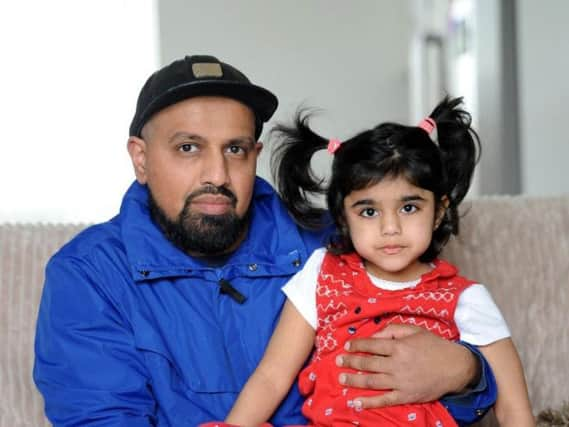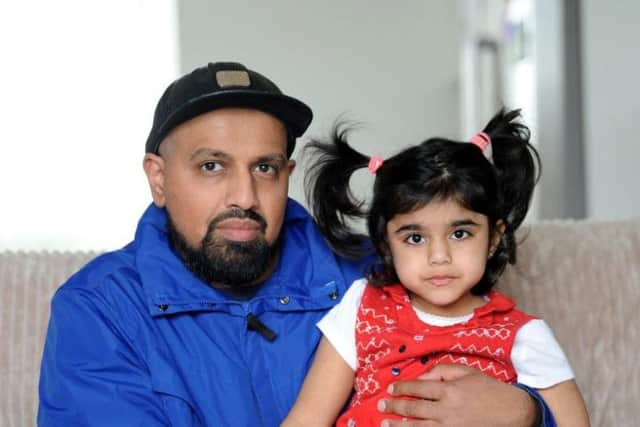Race against time to save little Saffa


Four-year-old Saffa Shehzan led a normal childhood until she was diagnosed with CLN2, a type of Batten disease, which affects just six people a year in the UK.
Less than a year on, she has already lost the ability to walk or eat – and is slowly going blind.
Advertisement
Hide AdAdvertisement
Hide AdHer illness is incurable and fatal, and will eventually kill her. The average life expectancy for Batten disease is just 10, with notable deterioration recorded between the ages of five and six.


A new drug – Brineura – has been put forward, which stopped the brain condition in its tracks for 20 of 23 children who completed a 48-week clinical trial.
It has been approved for use in America and across Europe, but the National Institute for Health and Care Excellence (NICE), which makes decisions on which drugs to fund through the NHS, has deemed it too costly.
A committee is set to discuss the issue on Wednesday, April 25, the day before Saffa’s fifth birthday, having already put off making a final verdict.
Advertisement
Hide AdAdvertisement
Hide AdIf treatment isn’t made available soon, Saffa’s condition may worsen to the point where her parents say they could face making a dreadful decision.


Mum Saima, 35, of Clifton Drive North, St Annes, said: “Timing is of the essence. If it reaches the point where her respiratory system deteriorates as well, it’s not fair on her.”
And dad Majid, also 35, said: “The precious time we should be spending with her, we are spending fighting.”
A year’s treatment reportedly costs between £500,000 and £550,000, with Dr Peter Jackson, chairman of the independent Highly Specialised Technology committee, saying in a NICE press release, that Brineura, while ‘not a cure’ for CLN2, was an ‘innovative treatment that is effective in the short-term in slowing the rate in which it progresses’.
Advertisement
Hide AdAdvertisement
Hide AdBut he added: “However, in the absence of long-term evidence about its effectiveness in stabilising the disease and preventing death, and having taken all the health and non-health-related benefits of cerliponase alfa (marketed as Brineura) into account, the committee considered the drug was not a good use of NHS resources.”
The yearly cost of treatment for the six patients diagnosed each year would be around £3 million and £3.3 million.
In contrast, prescribing aspirin and paracetemol – available for pence in shops – reportedly costs around £112.3 million a year.
Fylde MP Mark Menzies has written to health secretary Jeremy Hunt urging him to step in and make interim funding available before it’s too late, and wants a debate held in Parliament.
Advertisement
Hide AdAdvertisement
Hide AdHe has also written to Biomarin to ask if it can help Saffa now – as well as NICE.
He said: “I met the Shehzan family, including Saffa, recently at surgery and I was amazed at the bravery they were able to show in the face of such an horrific condition.
“Batten Disease is both cruel and incurable, robbing children of motor skills, sight, speech and more.
“Given the small number of children it affects each year, I see no reason why this treatment cannot be made available.”
He pledged Saffa and her family his ‘full support.’
Advertisement
Hide AdAdvertisement
Hide AdA happy youngster, Saffa would laugh, chatter, and dance – in her wellies – like any other tot until she suffered a sudden seizure in September 2016.
Medics initially suspected epilepsy but, after more fits and several tests, Batten disease was diagnosed.
Now wheelchair bound and fed through a tube, Saffa suffers constant Parkinson’s-type jerking, which causes her severe pain.
The only word she can now say is Isa, the name of her seven-year-old brother, and requires almost constant care.
Advertisement
Hide AdAdvertisement
Hide AdSaima, who questions whether early treatment for the condition would be cheaper than the long-term costs of care, transport, and home adaptation, said: “It’s an awful, cruel disease.”
Majid added: “Twelve months ago, she was normal, but the speed of the regression is incredible.”
Losing the ability to walk and talk is first to go, he said, before sight is lost. Then comes respiratory problems, with ‘99 per cent’ of deaths caused by infections.
“Usually five is a huge milestone,” Saima said. “But I dread her birthday because I know it’s getting closer.”
Advertisement
Hide AdAdvertisement
Hide AdMatilda Moffatt from Leyland was the first child in the UK to start Biomarin’s trial – with mum Melanie saying her daughter wouldn’t be here without Brineura.
Last month, Matilda was pictured playing on a bike in a snap uploaded to the ‘Matilda Moffatt Battens Disease Awareness’ Facebook page.
“First child in the UK, fourth in the world, to prove medication is safe for children with Batten’s disease – CLN2 – and have a quality of life,” the accompanying post said.
Siblings Ollie and Amelia Carroll, from Cheshire, also took part in the trial, and were headline news last year after meeting Prince Harry in hospital.
Advertisement
Hide AdAdvertisement
Hide AdTheir mum Lucy criticised NICE’s decision, saying the drug ‘showed positive signs of slowing the disease down’, and said: “Today we are angry, disappointed and completely heartbroken. “Without this treatment Ollie will deteriorate extremely fast, the thought of how fast makes us feel physically sick.
“As parents we are struggling to comprehend how we face all this again with Amelia.
“We have watched Ollie lose his abilities how on earth do we watch this happen all over again to our beautiful little girl.”
The FDA in America described Brineura as ‘the first approved treatment to slow loss of walking ability’ in sufferers aged three or over’.
Advertisement
Hide AdAdvertisement
Hide AdDirector of the Office of Drug Evaluation, Julie Beitz, said: “Approving the first drug for the treatment of this form of Batten disease is an important advance for patients suffering with this condition.”
When Brineura was approved by the European Commission, principal investigator Angela Schulz, from the children’s hospital at University Medical Centre Hamburg-Eppendorf, said: “For the first time since entering this field nearly 15 years ago, I can now tell families affected by [Batten] disease there is a meaningful treatment that may help their child, and provide hope.”
NICE told The Gazette the committee’s decision was a preliminary one, and said it went out to a public consultation that ended on Monday, March 5.
A meeting to discuss using Brineura was ‘rearranged to allow [Biomarin] to prepare and submit additional information for the committee to consider’, a spokeswoman said.
That will be held on Wednesday, April 25.
Advertisement
Hide AdAdvertisement
Hide AdA petition launched by the Batten Disease Family Association, which calls on NHS England, NICE, Jeremy Hunt, and Theresa May to fund the drug has been signed by around 90,000 people.
The charity called NICE’s original decision was ‘cruel and inaccurately-based’, and said: “The BDFA, alongside families of children on this treatment, have seen how well it works.
“We have seen children retain their skills and abilities whilst their peers, who are not on treatment, have very sadly lost not just their skills and abilities but also their lives.
“This treatment has given much longed for hope to families were previously there was none.”
Advertisement
Hide AdAdvertisement
Hide AdIt continued: “Whilst NICE acknowledge that the treatment improves children’s quality of life and slows the deterioration, they question its long term effectiveness.
“Are we suggesting that clinical trials of treatments should run for many decades to enable this data to be collected or is the fact that children on this treatment continue to thrive and live life to the full after three years not sufficient?
“Data continues to be collected from children and this continues to show the positive effects of this treatment.
“Children are able to access the treatment in the USA and other European countries whilst the UK continues to lag behind providing treatment for this ultra-rare disease.”